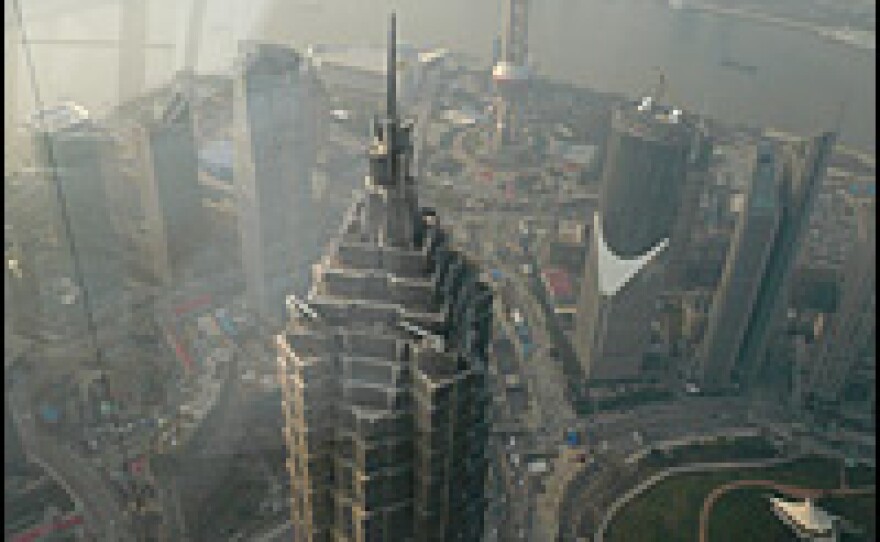
Shanghai's glittering skyline has for many become a symbol of China's modernization and its economic dynamism. But now, as the city's property market slides downward, some believe it's exposing weaknesses in China's economic model.
The view from the world's highest observation deck is breathtaking. Peering down from the 100th floor of the World Financial Center in Shanghai, skyscrapers and buildings sprout in all directions, resembling gigantic squared-off concrete shoots. It's almost impossible to believe that this was mostly farmland just 20 years ago.
However behind these gleaming glass facades, all is not well. Shanghai's real estate market is slumping.
"A global economic slowdown coupled with a significant amount of new supply that hit the market did result in rising vacancy factors, probably of upwards of 20 percent at this stage," says Mark Latham from property agents CB Richard Ellis, about the business district of Lujiazui.
Prices fell in 70 cities around China. And figures from CBRE show that major property investment transactions in Shanghai dropped 66 percent in the second half of last year.
"The bad part of the property sector is that transaction volumes — sales — basically went to almost zero for all of last year," says China strategist Andy Rothman from CLSA.
There are two differing schools of thought on how to read what's happening. CBRE's Latham has the more optimistic outlook.
"This is another economic dip, a downswing in the market. We've gone through them before, we'll come out of them again," he says.
But Huang Yasheng from MIT's Sloan School of Management says the modernist skyline of Shanghai's Pudong marks the moment when things started to go wrong,
"Future historians are going to look back at the rise of skyscrapers in Pudong, and draw conclusions that this will be the beginning of warning signs of problems in the Chinese economy," he says.
He argues that the economic crisis is exposing weaknesses in China's interventionist topdown style of capitalism. His cites as one example the city of Shanghai, which is known for its skyhigh economic growth. But he says official statistics show living standards for average Shanghainese have only shown moderate improvement, and the property boom has translated into "almost zero gain for people on the ground in terms of property income."
He says this has happened because the state has requisitioned land from its residents at artificially low prices, and sold it off at higher, market rates, keeping the difference.
"The way that China has urbanized is overbuilt, overinvested without making average people rich," he says. "Developers get rich, government officials get rich. Essentially you have a building boom, you have property development, but because the land prices are controlled by the government, the people don't get that much from the building boom."
But local governments have cashed in. By some estimates, property has accounted for half the revenues of local governments. So the bursting of the property bubble could leave them cash-strapped. So far, China's unleashed an array of measures to try to revitalize the property market, including five interest rate cuts since September. Developers have been urged to cut their prices, which were too high for many ordinary people. But when they have complied, this has led to fury and protests among homebuyers, like 28-year-old David Liu.
Sitting in a coffee shop with his wife Jane Chen, this pair of young well-educated professionals is among those who have benefited most from China's 30 years of reform. But they are seething about property discounts, which have ended up lowering the value of his brand new $200,000 flat in Shanghai's Pudong by about 20 percent — even before he's moved in.
"That's crazy," he says. "Totally unfair."
Now he and his wife have banded together with 150 other homebuyers to try to take on the developer Vanke.
"They said the value of our property would definitely go up," says Chen.
They're also accusing Vanke of cutting corners on quality. Despite the problems, their development is already sold out. But as others stay empty even as prices go down, it's widely expected that some smaller developers will go bankrupt. Independent economist Andy Xie says China's economic recovery depends on reviving the real estate market.
"Unless the property market turns around, it's really a waste of time talking about domestic demand. It's such a huge sector — 10 percent of GDP in terms of investment alone by the developers — I think it's just the key thing for the economy."
All over Shanghai, construction sites lie ominously silent, with building work suspended for the moment. That's happening all over the city, with construction likely to contract by 30 percent this year as developers feel the pinch. One prediction by DTZ property agency is that real estate prices could continue to fall until 2011.
Who knows, this slump could even herald an end to that forest of skyscrapers, characterized memorably as the architecture of irrational exuberance.
Copyright 2022 NPR. To see more, visit https://www.npr.org. 9(MDAzMjM2NDYzMDEyMzc1Njk5NjAxNzY3OQ001))







